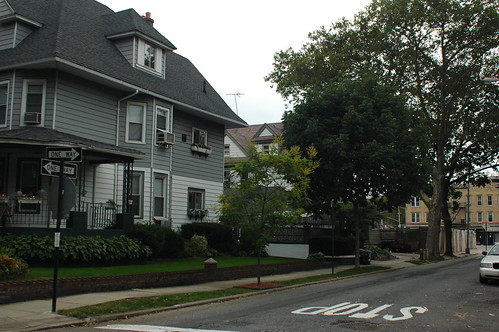To continue the networking which began at the Brooklyn Blogfest in May, Brooklyn bloggers are taking on the road to a different neighborhood each month. The first event is in June, the neighborhood is Flatbush, the location is Vox Pop on Cortelyou Road.
Please read the announcement post for full details, including how to RSVP for this event. That post will be kept up-to-date with any changes and additions as we learn about them.
The 10th Annual Brownstone Brooklyn Garden Walk
Update, 2007.06.07: All the Prospect Heights photos are up as of this morning. Clinton Hill photos are up as of Tuesday night.
I made it to all 16 stops on the Brownstone Garden Walk today. I think I should get some kind of prize.
I took about 350 photos today. I’ll be uploading them as I can. Here are the placeholders for the photos from each neighborhood, in the order I visited them.
I had no time to visit any of the community gardens. It was all I could do to visit each garden on the walk. I was going to bail out after Clinton Hill, but I started getting requests from some of the organizers for photos, since they had no one “official” taking photos and had no time themselves to do so.
Some general observations.
There was a lot of imagination demonstrated in the approaches taken and solutions to the challenges of each site. Making the best use of limited space is a common challenge, but so is shade, competition from tree roots, where to store your garden necessities, and so on. Yet even with these common challenges, the solutions were different. Lots of ideas for techniques to apply in similar situations.
I also gained an insight into why a garden-only tour would be preferable to a mixed house and garden tour. On a house tour, though I might get some ideas about what to do with my house, what if I don’t own a house? The gap between what I’m seeing and what i could imagine doing myself is more likely to be insurmountable with a house tour than a garden tour.
Even if it’s a single plant in a pot, everyone can garden, even those who don’t own any land. And the gardeners I met today were talkative. Everyone had some insight to share, some experience, some history. It just had a warmer feeling than I get when I’m on a house tour. Maybe it’s just how gardeners are. Maybe it’s just that I like gardens, and gardeners, more than “house people.”
Overall the event was well-organized. They had ample volunteers covering each stop. Most of them also seemed to be avid gardeners, and I had several enjoyable conversations with them, as well as owners and gardeners at several gardens. I gave out all my remaining Flickr cards. I need to order another set for the upcoming Brooklyn Blogade meetup in three weeks on June 24.
Some things I hope they improve upon next year:
- The promised “free shuttle van service” didn’t materialize. It took me over four hours to cover all three neighborhoods. But the neighborhoods are well served by bus service, at least better served than my neighborhood. The map provided showed the bus routes, which was a big help, since I hadn’t brought my own Brooklyn bus map.
- It wasn’t clear ahead of time that there were multiple locations to purchase tickets the day of the walk. I don’t know why, but somehow I thought that the BAM Triangle Garden was the starting point for the tour, and that you had to purchase tickets there the day of if you hadn’t purchased them in advance. Only when I got my map did I learn that there were ticket locations in all three neighborhoods. I would have planned my trip differently had I known that in advance.
- For someone who is not familiar with the neighborhoods, some things were confusing. It took me a half-hour just to find the BAM Triangle Garden. Once I did, I found this sign:
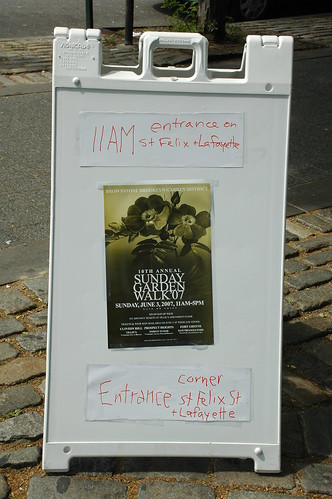 .
.
Well, I have no idea where St. Felix Street is. A simple arrow drawn on the sign might have sent me in the right direction. Just some additional wayfinding for out-of-towners such as myself.
But those are my only complaints. The event was otherwise well-organized, the gardens varied and all worthwhile. I got lots of ideas for my own gardens, and how we might be able to organize a garden-only tour for our area.
Brownstone Garden Walk, 1/3: Fort Greene
Hydrangea and Sweet Potato Vine, 116 Lafayette Avenue, Fort Greene, Brooklyn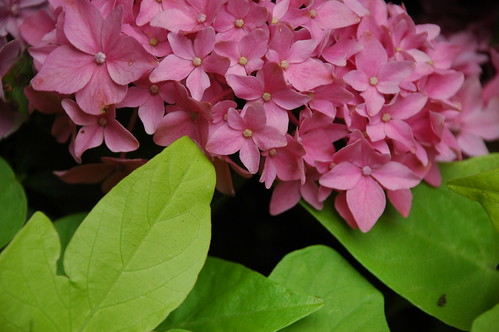
Numbered as they were in the tour guide. Listed in the order I visited them.
Stop #6: 42 South Portland Avenue











Related posts:
Brownstone Garden Walk, 2/3: Clinton Hill
Roses climbing on steel beam, 222 Washington Avenue, Clinton Hill, Brooklyn.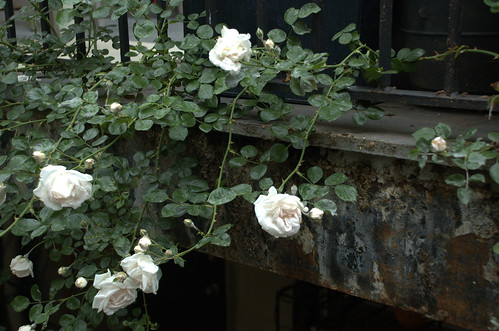
Numbered as they were in the tour guide. Listed in the order I visited them.
Stop #16: 152 Willoughby Avenue









Stop #15: 227 Washington Avenue












Stop #14: 219 Washington Avenue







Stop #11: 222 Washington Avenue






Stop #12: 218 & 216 Washington Avenue




























Stop #13: 190 Washington Avenue















Related posts
Clinton Hill (Flickr Collection)
The 10th Annual Brownstone Brooklyn Garden Walk
Brownstone Garden Walk, 1/3: Fort Greene
Brownstone Garden Walk, 3/3: Prospect Heights
Brownstone Garden Walk, 3/3: Prospect Heights
Shady Beauties at 116 St. Mark’s Avenue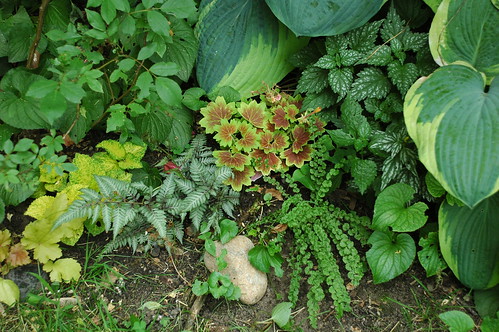
Numbered as they were in the tour guide. Listed in the order I visited them.
Stops #5 and 4: 493 and 491 Dean Street















Stop #3: 110 St. Mark’s Avenue

















Stop #2: 116 St. Mark’s Avenue












Stop #1: 118 St. Mark’s Avenue








Related posts:
Why I Garden: The Sensual Garden
First Cicada Molt of 2007, photo taken May 27 in my backyard in Flatbush, Brooklyn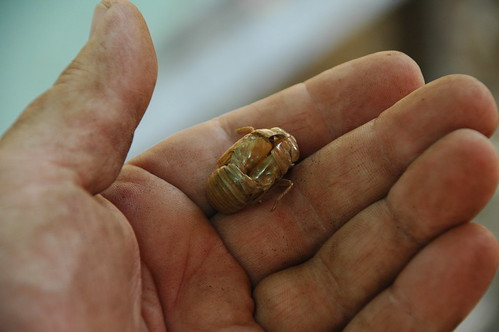
I’m afraid I have nothing of my own to offer up here. I was struck by the intersection of recent posts from two seemingly unconnected bloggers in the communities of gardening and Brooklyn, from Garden Rant and Blather in Brooklyn.
Yesterday, from Garden Rant:
In the archaeological museum in Naples, I learned something else about how the ancient Romans gardened–with loads of erotic art. For over 200 years, one of the great embarrassments of the excavation of Pompeii and Herculaneum–another ancient city in the Bay of Naples buried in ash at the same moment–were all the dirty things that were dug up.
– Sex in the Garden
And I just read today, from Blather in Brooklyn:
When the [Salon des Refusés] opened, Manet’s painting [Le Déjeuner sur l’Herbe (Luncheon on the Grass)] caused a public outcry. The critics were not offended by the nudity, but by the fact that the nudes had no supernatural or religious connotations; rather, they were shown as real people, modern, recognizable Parisians enjoying what appeared to be a bawdy, drunken picnic on the grass.
– Le Déjeuner sur l’Herbe
Definitely visit both blogs to read the full posts.
Gardening in the nude would not present my neighbors with the sensual delights presented by Manet and the artists of Pompeii, so I shouldn’t start now. Despite my modesty and discretion, nature and gardens have always been sensual experiences for me.
Biophilia is strong in me. Diane Ackerman‘s A Natural History of the Senses spoke to me like many others.
One of my earliest memories comes from outside a school playground. The maple tree there was surrounded by fallen leaves, crisp and brilliant. I stood among them, holding one particularly colorful leaf, examining it until a teacher broke my trance.
I have an earlier memory of sitting in the garden on the side of our first house. I pulled up almost all the baby carrots, grabbing their leaves and eating them right there, dirt and all. In my mind, the whole scene is illuminated by the filtered green light from the sun shining through the tomato plants towering over me.
I’m not always conscious of it, but when I garden, I engage and satiate all my senses. I garden to be surrounded by nature, to welcome it to me, to lose myself in it. The taste of Nasturiums, the movement and rustling of grasses, the shades of green in a single Hosta leaf, the perfume of rosemary, the songs of catbirds and cicadas. These ephemeral moments are why I garden.
651 Coney Island Avenue
Event, Brooklyn, June 3: Brownstone Brooklyn Garden Walk
Update, 2007.06.05: Read about my impressions and see photos from my visit.
Don’t know why I’m only just hearing about this. This is only the second garden-only tour in Brooklyn that I’ve heard of. There should be scores of them.
Seventeen private gardens may be visited on this self-guided tour through the three historic Brooklyn neighborhoods of Ft. Greene, Clinton Hill and Prospect Heights. Free shuttle van service will be provided, circling between the three neighborhoods. This may be your last chance to see a pair of adjacent gardens in Prospect Heights. These two gardens occupy the western edge of Brooklyn’s first botanic garden, Parmentier’s Horticultural & Botanic Gardens. They currently fall within the footprint of Bruce Ratner’s proposed 22-acre Atlantic Center and are threatened with condemnation through use of eminent domain.
Highlights of the tour include a triple lot garden with several cascades & ponds, a double lot garden with brick cottage & mature trees. Both of these gardens evolved over a long period of time created by individuals, avid gardeners,long time residents of Fort Greene and Clinton Hill, who owned adjoining properties and instead of filling space with building additions, used the empty spaces to create garden oases.
The Brownstone Brooklyn Garden District, sponsor of the Garden Walk, is a coalition of three Downtown Brooklyn neighborhoods, Fort Greene, Clinton Hill and Prospect Heights, with a common interest in improving quality of life through greening of the urban environment. Garden Walk ticket sales support the Annual Fall Bulb Give-Away for planting flowering bulbs in public spaces throughout the Garden District.
I’m hoping I can make it, weather cooperating.
Via Brownstoner.
Help me select the BBG Visitors Group photo for June
Lavender border along the Cranford Rose Garden, taken May 28, 2007, by TheGirlsNY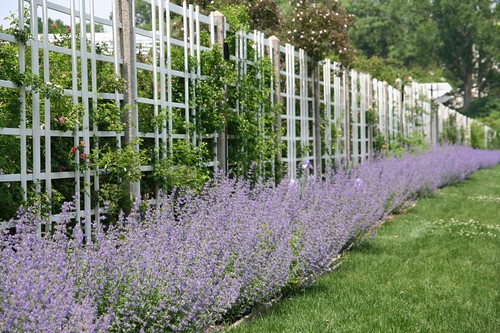
Update 2007.06.08: I selected the photo above as the BBGV group photo for June 2007. Thanks to everyone who weighed in and contributed suggestions.
Be sure to check out the comments to this post and follow the links for an interesting blog conversation about why there are so few people in these photos.
I’m a co-admin for a Flickr group, the Brooklyn Botanic Garden Visitors photo pool. In May I thought I would start rotating the group photo which represents the group in Flickr. I’m trying to pick the photo for June.
It’s a tough decision. Over 200 photos were posted in May, out of over 1,100 photos since Paul-M started the group last year. And May is such an explosion. There was the Cherry Blossom Festival, of course, but there are also tulips, azaleas, wisteria, and even roses that have started blooming.
So, help me pick. Here are a few of my favorites of the 200, in order by the date taken. Leave a comment and let me know your favorites. Or you can nominate another one from the pool. The only criteria are that the picture was taken during May 2007, and that it’s not one of my photos. I’ll make a decision over the weekend.
Pink Snow, taken May 6, 2007, by Abizeleth
Cherry Lane, Taken May 9, 2007, by Keith Carver
Tulips, taken May 12, 2007, by James Prescott
Wisteria, taken May 15, 2007, by PaulS
Borage?, taken May 29, 2007, by amg
Meta: Comment moderation temporarily enabled
Update 2007.06.01: RESOLVED. I’ve disabled moderation and restored word verification (CAPTCHA) for comments.
Due to email problems I’m having, I’ve temporarily enabled comment moderation so I can review comments before they appear on this blog.
Normally I get an email when a comment is posted. This notifies me when a comment is posted. It also allows me to review the comments and delete the few spam comments that get posted within hours of their appearance.
Because I now need to explicitly review each comment before it appears, there will be a delay before your comment appears on this blog.
In exchange, I’ve also temporarily turned off the word verification (CAPTCHA) feature which prevents spambots from posting comments.
Hope to get things back to normal soon!
Thanx – Xris


















































